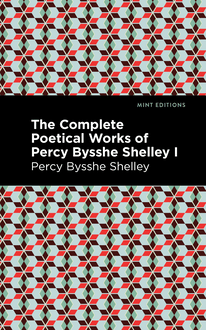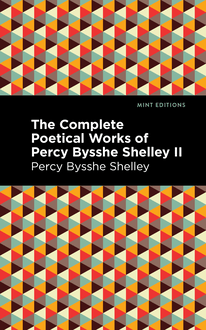-
 Univers
Univers
-
 Ebooks
Ebooks
-
 Livres audio
Livres audio
-
 Presse
Presse
-
 Podcasts
Podcasts
-
 BD
BD
-
 Documents
Documents
-
- Cours
- Révisions
- Ressources pédagogiques
- Sciences de l’éducation
- Manuels scolaires
- Langues
- Travaux de classe
- Annales de BEP
- Etudes supérieures
- Maternelle et primaire
- Fiches de lecture
- Orientation scolaire
- Méthodologie
- Corrigés de devoir
- Annales d’examens et concours
- Annales du bac
- Annales du brevet
- Rapports de stage
La lecture à portée de main
Vous pourrez modifier la taille du texte de cet ouvrage
Découvre YouScribe en t'inscrivant gratuitement
Je m'inscrisThe Complete Poetical Works of Percy Bysshe Shelley Volume III , livre ebook
Découvre YouScribe en t'inscrivant gratuitement
Je m'inscrisEn savoir plus
Vous pourrez modifier la taille du texte de cet ouvrage
En savoir plus

Description
The Complete Poetical Works of Percy Bysshe Shelley Volume III (1914) compiles some of Percy Bysshe Shelley’s best-known works as a leading poet, playwright, and political thinker of the nineteenth century. As a leading figure among the English Romantics, Shelley was a master of poetic form and tradition who recognized the need for radical change in the social order. His work has influenced such writers and intellectuals as Karl Marx, Mahatma Gandhi, W. B. Yeats, and George Bernard Shaw. In this final volume of Shelley’s collected works, the poet’s skill as a translator is on full display. Included within are translations from the Greek of Homer and Plato, from the Latin of Vergil, from the Spanish of Calderon, from the German of Goethe, and from the Italian of Dante, to name only a few. In addition, The Complete Poetical Works of Percy Bysshe Shelley Volume III contains some of Shelley’s earliest works as a poet, such as Original Poetry by Victor and Cazire—written with his sister and originally published in 1810—and other examples of juvenilia. Many of these poems remained unpublished upon Shelley’s death, including “Eyes: A Fragment,” which made its first appearance in an 1870 edition of Shelley’s works published by William Michael Rossetti. In this poem, a deceptively simple lyric, Shelley conflates language and vision to capture the communication made possible only through silence, which allows one “look [to] light a waste of years, / Darting the beam that conquers cares / Through the cold shower of tears.” In these fragments, songs, translations, and youthful verses, Shelley demonstrates his workmanlike ability with language, a tirelessness fueled with a passion as thrilling as it must be rare. With a beautifully designed cover and professionally typeset manuscript, this edition of Percy Bysshe Shelley’s The Complete Poetical Works of Percy Bysshe Shelley Volume III is a classic of English literature reimagined for modern readers.
Sujets
Informations
| Publié par | Mint Editions |
| Date de parution | 11 mai 2021 |
| Nombre de lectures | 0 |
| EAN13 | 9781513287010 |
| Langue | English |
| Poids de l'ouvrage | 1 Mo |
Informations légales : prix de location à la page 0,0500€. Cette information est donnée uniquement à titre indicatif conformément à la législation en vigueur.
Extrait
The Complete Poetical Works of Percy Bysshe Shelley Volume III
Percy Bysshe Shelley
The Complete Poetical Works of Percy Bysshe Shelley Volume III was first published in 1800.
This edition published by Mint Editions 2021.
ISBN 9781513281995 | E-ISBN 9781513287010
Published by Mint Editions®
minteditionbooks.com
Publishing Director: Jennifer Newens
Design & Production: Rachel Lopez Metzger
Project Manager: Micaela Clark
Typesetting: Westchester Publishing Services
C ONTENTS T RANSLATIONS H YMN TO M ERCURY . T RANSLATED FROM THE G REEK OF H OMER H OMER ’ S H YMN TO C ASTOR AND P OLLUX H OMER ’ S H YMN TO THE M OON H OMER ’ S H YMN TO THE S UN H OMER ’ S H YMN TO THE E ARTH : M OTHER OF A LL H OMER ’ S H YMN TO M INERVA H OMER ’ S H YMN TO V ENUS . (V ERSES 1-55, WITH S OME O MISSIONS ) T HE C YCLOPS . A S ATYRIC D RAMA T RANSLATED FROM THE G REEK OF E URIPIDES E PIGRAMS 1. To Stella. From the Greek of Plato 2. Kissing Helena. From the Greek of Plato 3. Spirit of Plato. From the Greek 4. Circumstance. From the Greek F RAGMENT OF THE E LEGY ON THE D EATH OF A DONIS . F ROM THE G REEK OF B ION F RAGMENT OF THE E LEGY ON THE D EATH OF B ION . F ROM THE G REEK OF M OSCHUS F ROM THE G REEK OF M OSCHUS P AN , E CHO , AND THE S ATYR . F ROM THE G REEK OF M OSCHUS F ROM V ERGIL ’ S T ENTH E CLOGUE . (V ERSES 1-26) T HE S AME . (A S REVISED BY M R . C.D. L OCOCK ) F ROM V ERGIL ’ S F OURTH G EORGIC . (V ERSES 360 E T S EQ .) S ONNET . F ROM THE I TALIAN OF D ANTE T HE F IRST C ANZONE OF THE C ONVITO . F ROM THE I TALIAN OF D ANTE M ATILDA G ATHERING F LOWERS . F ROM THE P URGATORIO OF D ANTE F RAGMENT . A DAPTED FROM THE V ITA N UOVA OF D ANTE U GOLINO . I NFERNO 33, 22-75, T RANSLATED BY M EDWIN AND CORRECTED BY S HELLEY S ONNET . F ROM THE I TALIAN OF C AVALCANTI S CENES FROM THE M AGICO P RODIGIOSO . F ROM THE S PANISH OF C ALDERON S TANZAS FROM C ALDERON ’ S C ISMA DE I NGLATERRA . T RANSLATED BY M EDWIN AND CORRECTED BY S HELLEY S CENES FROM THE F AUST OF G OETHE J UVENILIA Q UEEN M AB . A P HILOSOPHICAL P OEM , WITH N OTES T O H ARRIET ***** Q UEEN M AB N OTE ON Q UEEN M AB , BY M RS . S HELLEY V ERSES ON A C AT F RAGMENT : O MENS E PITAPHIUM . (L ATIN V ERSION OF THE E PITAPH IN G RAY ’ S E LEGY ) I N H OROLOGIUM A D IALOGUE T O THE M OONBEAM T HE S OLITARY T O D EATH L OVE ’ S R OSE E YES : A F RAGMENT O RIGINAL P OETRY BY V ICTOR AND C AZIRE 1. ‘Here I sit with my paper, my pen and my ink’ 2. To Miss —— (Harriet Grove) From Miss —— (Elizabeth Shelley) 3. Song: ‘Cold, cold is the blast’ 4. Song: ‘Come (Harriet)! sweet is the hour’ 5. Song: Despair 6. Song: Sorrow 7. Song: Hope 8. Song: Translated from the Italian 9. Song: Translated from the German 10. The Irishman’s Song 11. Song: ‘Fierce roars the midnight storm’ 12. Song: To (Harriet) 13. Song: To—(Harriet) 14. Saint Edmond’s Eve 15. Revenge 16. Ghasta or, the Avenging Demon!!! 17. Fragment, or the Triumph of Conscience P OEMS FROM S T . I RVYNE , OR , THE R OSICRUCIAN 1.—Victoria 2.—On the Dark Height of Jura 3.—Sister Rosa: A Ballad 4.—St. Irvyne’s Tower 5.—Bereavement 6.—The Drowned Lover P OSTHUMOUS F RAGMENTS OF M ARGARET M CHOLSON A DVERTISEMENT W AR F RAGMENT : S UPPOSED TO BE AN E PITHALAMIUM OF F RANCIS R AVAILLAC AND C HARLOTTE C ORDAY S YMPHONY D ESPAIR F RAGMENT T HE S PECTRAL H ORSEMAN M ELODY TO A S CENE OF F ORMER T IMES S TANZA FROM A T RANSLATION OF THE M ARSEILLAISE H YMN B IGOTRY ’ S V ICTIM O N AN I CICLE THAT C LUNG TO THE G RASS OF A G RAVE L OVE O N A F ETE AT C ARLTON H OUSE : F RAGMENT T O A S TAR T O M ARY W HO D IED IN THIS O PINION A T ALE OF S OCIETY AS IT IS : F ROM F ACTS , 1811 T O THE R EPUBLICANS OF N ORTH A MERICA T O I RELAND O N R OBERT E MMET ’ S G RAVE T HE R ETROSPECT : CWM E LAN , 1812 F RAGMENT OF A S ONNET . T O H ARRIET T O H ARRIET S ONNET . T O A B ALLOON L ADEN WITH K NOWLEDGE S ONNET . O N L AUNCHING S OME B OTTLES F ILLED WITH K NOWLEDGE INTO THE B RISTOL C HANNEL T HE D EVIL ’ S W ALK . A B ALLAD F RAGMENT OF A S ONNET . F AREWELL TO N ORTH D EVON O N L EAVING L ONDON FOR W ALES T HE W ANDERING J EW ’ S S OLILOQUY E VENING . T O H ARRIET T O I ANTHE S ONG FROM THE W ANDERING J EW F RAGMENT FROM THE W ANDERING J EW T O THE Q UEEN OF M Y H EART
T RANSLATIONS
(Of the Translations that follow a few were published by Shelley himself, others by Mrs. Shelley in the “Posthumous Poems”, 1824, or the “Poetical Works”, 1839, and the remainder by Medwin [1834, 1847], Garnett [1862], Rossetti [1870], Forman [1876] and Locock [1903] from the manuscript originals. Shelley’s “Translations” fall between the years 1818 and 1822.)
H YMN TO M ERCURY
Translated from the Greek of Homer
(Published by Mrs. Shelley, “Posthumous Poems”, 1824. This alone of the “Translations” is included in the Harvard manuscript book. ‘Fragments of the drafts of this and the other Hymns of Homer exist among the Boscombe manuscripts’ [Forman].)
1
Sing, Muse, the son of Maia and of Jove,
The Herald-child, king of Arcadia
And all its pastoral hills, whom in sweet love
Having been interwoven, modest May
Bore Heaven’s dread Supreme. An antique grove
Shadowed the cavern where the lovers lay
In the deep night, unseen by Gods or Men,
And white-armed Juno slumbered sweetly then.
2
Now, when the joy of Jove had its fulfilling,
And Heaven’s tenth moon chronicled her relief,
She gave to light a babe all babes excelling,
A schemer subtle beyond all belief;
A shepherd of thin dreams, a cow-stealing,
A night-watching, and door-waylaying thief,
Who ’mongst the Gods was soon about to thieve,
And other glorious actions to achieve.
3
The babe was born at the first peep of day;
He began playing on the lyre at noon,
And the same evening did he steal away
Apollo’s herds;—the fourth day of the moon
On which him bore the venerable May,
From her immortal limbs he leaped full soon,
Nor long could in the sacred cradle keep,
But out to seek Apollo’s herds would creep.
4
Out of the lofty cavern wandering
He found a tortoise, and cried out—‘A treasure!’
(For Mercury first made the tortoise sing)
The beast before the portal at his leisure
The flowery herbage was depasturing,
Moving his feet in a deliberate measure
Over the turf. Jove’s profitable son
Eying him laughed, and laughing thus begun:—
5
‘A useful godsend are you to me now,
King of the dance, companion of the feast,
Lovely in all your nature! Welcome, you
Excellent plaything! Where, sweet mountain-beast,
Got you that speckled shell? Thus much I know,
You must come home with me and be my guest;
You will give joy to me, and I will do
All that is in my power to honour you.
6
‘Better to be at home than out of door,
So come with me; and though it has been said
That you alive defend from magic power,
I know you will sing sweetly when you’re dead.’
Thus having spoken, the quaint infant bore,
Lifting it from the grass on which it fed
And grasping it in his delighted hold,
His treasured prize into the cavern old.
7
Then scooping with a chisel of gray steel,
He bored the life and soul out of the beast.—
Not swifter a swift thought of woe or weal
Darts through the tumult of a human breast
Which thronging cares annoy—not swifter wheel
The flashes of its torture and unrest
Out of the dizzy eyes—than Maia’s son
All that he did devise hath featly done.
8
…
And through the tortoise’s hard stony skin
At proper distances small holes he made,
And fastened the cut stems of reeds within,
And with a piece of leather overlaid
The open space and fixed the cubits in,
Fitting the bridge to both, and stretched o’er all
Symphonious cords of sheep-gut rhythmical.
9
When he had wrought the lovely instrument,
He tried the chords, and made division meet,
Preluding with the plectrum, and there went
Up from beneath his hand a tumult sweet
Of mighty sounds, and from his lips he sent
A strain of unpremeditated wit
Joyous and wild and wanton—such you may
Hear among revellers on a holiday.
10
He sung how Jove and May of the bright sandal
Dallied in love not quite legitimate;
And his own birth, still scoffing at the scandal,
And naming his own name, did celebrate;
His mother’s cave and servant maids he planned all
In plastic verse, her household stuff and state,
Perennial pot, trippet, and brazen pan,—
But singing, he conceived another plan.
11
…
Seized with a sudden fancy for fresh meat,
He in his sacred crib deposited
The hollow lyre, and from the cavern sweet
Rushed with great leaps up to the mountain’s head,
Revolving in his mind some subtle feat
Of thievish craft, such as a swindler might
Devise in the lone season of dun night.
12
Lo! the great Sun under the ocean’s bed has
Driven steeds and chariot—the child meanwhile strode
O’er the Pierian mountains clothed in shadows,
Where the immortal oxen of the God
Are pastured in the flowering unmown meadows,
And safely stalled in a remote abode.—
The archer Argicide, elate and proud,
Drove fifty from the herd, lowing aloud.
13
He drove them wandering o’er the sandy way,
But, being ever mindful of his craft,
Backward and forward drove he them astray,
So that the tracks which seemed before, were aft;
His sandals then he threw to the ocean spray,
And for each foot he wrought a kind of raft
Of tamarisk, and tamarisk-like sprigs,
And bound them in a lump with withy twigs.
14
And on his feet he tied these sandals light,
The trail of whose wide leaves might not betray
His track; and then, a self-sufficing wight,
Like a man hastening on some distant way,
He from Pieria’s mountain bent his flight;
But an old man perceived the infant pass
Down green Onchestus heaped like beds with grass.
15
The old man stood dressing his sunny vine:
‘Halloo! old fellow with the crooked shoulder!
You grub those stumps? before they will bear wine
Methinks even you must grow a little older:
Attend, I pray, to this advice of mine,
As you would ’scape what might appal a bolder
-
 Univers
Univers
-
 Ebooks
Ebooks
-
 Livres audio
Livres audio
-
 Presse
Presse
-
 Podcasts
Podcasts
-
 BD
BD
-
 Documents
Documents
-
Jeunesse
-
Littérature
-
Ressources professionnelles
-
Santé et bien-être
-
Savoirs
-
Education
-
Loisirs et hobbies
-
Art, musique et cinéma
-
Actualité et débat de société
-
Jeunesse
-
Littérature
-
Ressources professionnelles
-
Santé et bien-être
-
Savoirs
-
Education
-
Loisirs et hobbies
-
Art, musique et cinéma
-
Actualité et débat de société
-
Actualités
-
Lifestyle
-
Presse jeunesse
-
Presse professionnelle
-
Pratique
-
Presse sportive
-
Presse internationale
-
Culture & Médias
-
Action et Aventures
-
Science-fiction et Fantasy
-
Société
-
Jeunesse
-
Littérature
-
Ressources professionnelles
-
Santé et bien-être
-
Savoirs
-
Education
-
Loisirs et hobbies
-
Art, musique et cinéma
-
Actualité et débat de société
- Cours
- Révisions
- Ressources pédagogiques
- Sciences de l’éducation
- Manuels scolaires
- Langues
- Travaux de classe
- Annales de BEP
- Etudes supérieures
- Maternelle et primaire
- Fiches de lecture
- Orientation scolaire
- Méthodologie
- Corrigés de devoir
- Annales d’examens et concours
- Annales du bac
- Annales du brevet
- Rapports de stage




















